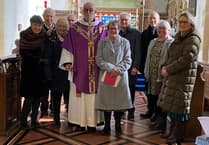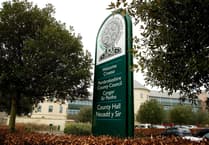The Pembrokeshire branch of Wales’ nationalist party, Plaid Cymru, is set to launch a campaign to ‘rectify the anomalies of the past’ by renaming the sea channel between Wales and Ireland the Celtic Channel, expunging a near 450 year-old reference to England’s patron saint, St George.
Historians say that Elizabethan maritime explorer Captain Martin Frobisher (1535 - 1594) named the waterway St George's Channel in 1577 in recognition of the bravery and gallantry of St George, the legendary dragon-slaying patron saint of England.
At its narrowest point, the St George's Channel stretches 47 miles from Carnsore, County Wexford in Ireland to St David's Point in Pembrokeshire, west Wales.
Now, Plaid Cymru councillors in Pembrokeshire say that a name change to the Celtic Channel is “logical, just and overdue.”
Wales’ nationalist party is set to launch a local and Wales-wide campaign to drive forward an official name change of the channel from St George's to the Celtic Channel.
Spearheaded by Plaid’s Pembrokeshire councillors, supporters hope elected representatives in County Wexford on the Irish side of the channel will join the Welsh campaign.
St George’s Channel is the shortest navigation channel for sea ferries crossing between west Wales and Ireland.
Cllr Michael Williams, Plaid Cymru councillor for Tenby’s North ward and Deputy Leader of the Party’s group on Pembrokeshire County Council said: “Changing the name of the St George’s Channel, off the coast of Pembrokeshire, to the Celtic Channel is logical, just and overdue.
“The Celtic Sea already exists, so the historic reference to St George is inappropriate in this geographic and cultural context.
“We have moved on from the world as it was in the 1570s. Wales today has a much greater sense national awareness and identity with an elected Senedd and a growing sense of our own cultural direction.”
Councillor Williams, himself once a keen yachtsman sailing along the Pembrokeshire coast and into St George’s Channel, continued: “Wales needs to distance itself from the old imperial regimes of hundreds of years ago and we need to emphasise our Celtic roots. One way of doing this is by rectify the anomalies of the past.'”
Cllr Williams intends to extend his campaign to the Senedd in Cardiff, stating: “I intent to raise this matter with Cefin Campbell, Senedd Member for Mid and West Wales, to see what can be done to raise this matter in the Senedd itself.
“At the very least, we need a local and perhaps national petition in support of the name change from St George’s to Celtic.”
Demands for the Channel’s have been accentuated in the light of Captain Frobisher’s apparent mistreatment, murder and trafficking of Inuit natives living on Baniff Island, Canada, when Frosher and his crew landed there in 1577.
The Historian's Perspective:
Historians point to the wider cultural, political and historic context of exploration, national consciousness and England’s role in the world in the 1570s.
Dr Richard Hall of the Department of History, Heritage and Classics at the University of Swansea says the evocation of the legendary name of St George must be seen in the wider political and cultural backdrop of early modern England, Wales and Ireland.
He said: “In the so-called Age of Exploration, the Spanish and Portuguese had established a head start in the colonisation of the Americas, for instance, with Spain in particular having emerged as a ‘Catholic superpower’.
“English explorers and mariners such as Frobisher and many others to sought to build an Empire of their own to keep up with rivals who seemingly posed a threat to England's survival - more especially, by the late 1500s, a Protestant England.
With reference to the apparent ''anti-Celtic'' aspects of the St George's Channel controversy, Dr Hall said: “Some of the earliest attempts at Early Modern English colonisation was in Ireland. This had begun from 1536.
“It might be the case that the naming by Captain Frobisher of ‘St George’s Channel’ is an instance of perceived and applied cultural condescension and so-called supremacy over Irish Catholicism.
Asked about the new renaming controversy emerging in Wales, Dr Hall said: “As for Wales, since the Act of Union of 1536 and 1543, we have a situation that might point to the fact that it was the more powerful nation of England that took it upon itself to name landscapes, oceans, channels and other natural features after its own culturally-cherished figureheads and historically revered figures.
“St George, in the earlier Medieval period, had been a cult-like figure in England and remained a well-respected expression of a more universal English identity.
“The naming of the St George’s Channel is an expression of supreme sovereignty and perhaps the evocation of the ultimate English spirit of chivalry, courage, piety and ‘true Englishness’.”




